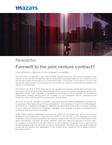
Farewell to the joint venture contract?
The tax reform, contained in Law 1819 of 2016, denaturalized the joint account contract. Such intrusion of tax law into contract law was so wrong that it has jeopardized the very existence of the mentioned contract and its daily use in commercial traffic. The purpose of this article is to show how the wrong implementation of a tax policy can not only put an end to a commercial law institution but also be unconstitutional.
Until before Law 1819 of 2016, there was no tax regulation for business collaboration contracts; they were governed by the special tax rules existing for them as well as by the jurisprudence and doctrine applicable to them. Such regulation, in its article 20, introduced a uniform regulation for all business collaboration contracts, among which are included, in a non-exhaustive manner, consortiums and temporary unions and the joint ventures contract, among others.
The error of such tax regulation consisted in assuming that all business collaboration contracts are, for purposes of their accounting and financial treatment, "Joint Operations" and not "Joint Businesses" and, therefore, in establishing obligations related to the reporting and declaration of assets, liabilities, income, costs and expenses for all parties, regardless of the purpose and type of contract and the contractual role assumed by the parties.
Under IFRS, business collaboration contracts are called Joint Arrangements, and as such can be divided into Joint Operations or Joint Ventures (IFRS 11 and IAS 28). In Joint Operations, the joint controllers of the business (the parties) have rights to all elements of the business and therefore must report and disclose, in parallel, the assets, liabilities, revenues, costs and expenses. This is the case, for example, of consortiums and joint ventures. In joint ventures, the parties have a right over the remaining assets and over the profit (or loss) of the business. Therefore, they are called to declare exclusively this, treating their participation in the contract as an investment and to apply, therefore, the equity method.
The error consists then in the fact that the tax law assumes that all business collaboration contracts are Joint Operations and does not conceive the existence -within said genre- of Joint Businesses, as is the case of joint account contracts. This implies, in practice, that both the active and hidden participants, within the framework of a joint account contract, must declare their participation in the income, costs and expenses of the same, when, by the essence of the contract, the hidden participant is only called upon to declare its profit or loss arising therefrom, but never income, costs or expenses over which it has no interference whatsoever (Art. 507 of the Code of Commerce).
The denaturalization of the joint venture contract, due to the undue interference of tax law in contract law, and the implementation of an improvised tax policy, not only causes difficulties in the commercial traffic, but also violates the prevalence of a fair order within the framework of the Social State of Law and the freedom of enterprise.


